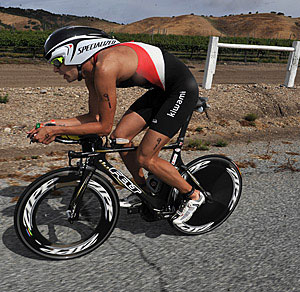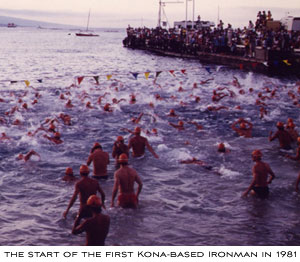RD Diary: Sign up now!

Editor's note: This is the third of a series of 13 weekly articles originally published on Slowtwitch in 2003. The articles chronicle newbie RD Jeff Henderson's journey toward the production of his first race: the Musselman Triathlon in Upstate New York. After these 13 weeks worth of diary entries, we'll flow directly into a new series Jeff is writing for us, where he talks about his challenges and goals now, as he prepares for Year-7 of Musselman.
There's a lot that has to happen before you allow people to send you money. For instance, you have to get your waivers in order. How many waivers do you need? Does everyone have to sign them all? What's a legally binding way to "sign" them? (Does clicking on a button count?) How old do you have to be before you can decide what's risky? For these and all other litigiousness, I asked my friend's father, an attorney, to be our Risk Manager.
"What do I have to do?" he asked.
"Make sure I don't get sued."
"I can do that."
Richard Nuffort is partner in the esteemed Zimmerman, Pfannebecker, & Nuffort office in Lititz, Pennsylvania. He's an avid reader of Slowtwitch and a cyclist himself. I knew we had the right man for the job when he asked if coming to the race could be considered a business expense.
Along with a sound waiver you also need some sound policies before you can allow registration. Will race transfers be allowed? (On penalty of death, says USAT.) What's your refund policy? When's check-in? Can you mail me a packet so I don't have to come the day before?
Picking a day for registration to happen is a messy decision. The Musselman Half-Iron will start at 7AM so the roadways will be clear by early afternoon, thereby pleasing the Sheriff's Department. The early start rules out raceday registration, so it has to happen the day before. But what if racers are coming from Rochester, an hour down the road? Do we make them drive two hours round-trip to pick up a t-shirt and some junk mail we've stuffed into a goody bag?
On the one hand, requiring people to come the day before makes good sense financially and logistically. Less congestion raceday morning is a big plus. More people will potentially spend the night at a local hotel, and the city's economic indicators like that. More people will come to the pre-race dinner, creating more revenue for the race and lower entry fees as a result. And the expo will be well-attended, which the sponsors like.
Conversely, though, you risk fostering ill-will among local people who started out excited to have a local option in which they don't have to devote an entire weekend to driving and racing. How many people won't do the race because you require them to be there on Saturday? That is the hundred-dollar question.
So I try to compromise. Long course racers (or half-ironman competitors, if the WTC allowed us to say such a thing) will be required to come the day before. Sprinters, however, will have the option to pick up their packets raceday, in the wee hours of the morning, because there will be fractionally more time before their race starts. And who would want to devote two entire days to a race that could potentially take an hour?
Dan's EWP suggests allowing pre-race packet mailing for a small administrative fee. That sounds like an excellent idea, but alas those days are over… USAT says nope, you have to see an authentic, valid, non-counterfeit, hold-it-up-to-the-light photo ID from an actual person standing before you so you can compare dental records.
And I'm going to do everything USAT tells me to do because, quite frankly, the USAT sanction is a goldmine for race directors. For a mere $250, a properly-completed sanction app will bring me a boatload of liability insurance, sponsor contacts, mailing labels so I can send you even more junk mail, and probably double my field because of the USAT rankings now compiled. That's the first question people ask about the race: will it be sanctioned?
I went to two very different meetings this week. (That's another popular theme of race directing: meetings.) On Monday the first Musselman Committee Meeting was held, in which our core committee came together to dream of What Could Be. On the following Thursday I attended the first Miracle in the Park meeting for the 23rd running of a Geneva tradition, in which a small group of dedicated members discussed What Has Been And Will Most Certainly Be Again.
The Miracle in the Park's canoe-bike-run will be June 5th this year and follow largely the same format it has for the previous 22. Betty and Jan will make the post-race lunches themselves, Edna Mae will line up the volunteer ambulances, and Ted and his veteran wife Elaine will "sit in some dark box over in the corner and run the timing system." Ted told me he enjoys sitting in dark boxes.
An anxious moment occurred when Ted revealed his computer program, which has ably handled results for the past quarter century, was currently not working. Edna Mae was beside herself.
"But don't worry!" Ted told us optimistically, "I'll whip 'er into shape by June. What about music? Do we need music? I've got a great collection of Chris Smither. He keeps the beat with his feet."
In contrast, the Musselman committee is new to all of this. But with new life comes new ideas and the ability to quickly depart from what doesn't work. I deeply respect the work that The Miracle has done over the years to raise hundreds of thousands of dollars to combat local hunger. But with time participation ebbs, and something is needed to sustain the race. I hope that our efforts at Musselman can do that for the Miracle.
And if we can't, maybe there's someone we can sue. I'll get my Risk Manager on that.




Start the discussion at slowtwitch.northend.network